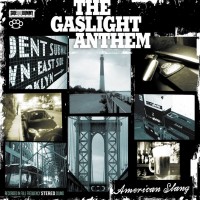
The Gaslight Anthem
American Slang (2010)
Jordan Rogowski
It's not easy to evoke the sights and sounds of an entire time period through an album, but twice already the Gaslight Anthem have managed to do just that. Their ruminations of drive-ins and days much simpler are as much rooted in Americana as their idol Bruce Springsteen, their style rooted as much in punk rock and soul as the golden era of rock ân' roll.
Their flawless amalgamation of styles has garnered them fans and critical acclaim in spades, so it's not a stretch to think that they're feeling the weight of the world on their shoulders in releasing their third-full length album, American Slang.
Well, the Jersey boys can breathe easy and take a load off--they've knocked it out of the park.
The title track, "American Slang" is a rousing and triumphant opener that uses punchy riffs and singer Brian Fallon's warm, gripping baritone to rope the listener in immediately. The New Brunswick quartet are perhaps better than any current band at playing exclusively to their strengths, and key among those strengths is Fallon's voice. Every lyric, every verse and every "whoa-oh" chorus is impeccably delivered; Fallon is the consummate frontman, and his voice is no longer lost in miles of reverb as it was on 2008's The '59 Sound. When he sings "And they cut me to ribbons and taught me to drive, I got your name tattooed inside of my arm / I called for my father but my father had died, while you told me fortunes, in American slang" before some slick chord progressions segue into the next verse, the entire band sounds so in tune and so cohesive. Because of that, the song-to-song transitions are seamless.
That becomes immediately evident when the mid-tempo "Bring It On" leads flawlessly into the "whoa-ooh"s and finger-snapping of the low-key "The Diamond Church Street Choir." The former relies on power chords and a larger-than-life chorus backstopped by some lush, clean riffing and a toe-tapping rhythm that just won't quit--the latter on Fallon's unfailingly upbeat crooning and some '60s pop guitar tones--but the momentum and feel-good spirit moves form one song to the next with the greatest of ease.
However intangible the phrase may be, that feel-good spirit is present in each of the album's 10 songs and is a primary reason that the album as a whole is such a joy. It's the same feel-good spirit that has been a source of success for everyone from Chuck Berry to Joe Strummer to Bruce Springsteen, and every single Gaslight Anthem inspiration in between.
Even songs like "Orphans," which takes on a decidedly more serious subject matter, are so full of that spirit that it's impossible to not feel uplifted. Quick, clean riffing carries most of the song above subtle waves of distortion, but it's Fallon's tale of perseverance that hits the hardest:
"Goodbye circus wheel, may you rest along the seas / Well, I have given you the fire of my youth and the triumph of my enemies / And goodbye fairweather home, and your faithless factories / I have given you the blood and the truth, from the wounds that have been laid on me / And whatever they left, I kept it in my own heart / And the lonesome understand, with the choirs in my head, and we were orphans before we were ever the sons of regret."
"Old Haunts" strongly resonates through lyrics as well, but in a different way. The, light, bouncy track derives its rhythm from some clever chord progressions and Fallon's stories of teenage mischief ("Oh cherry bomb you are a mystery, exploding sparking quiet nights / My teenage heart pumped all my misery baby, to fingertips that might ignite") and relationships gone awry ("And with the window down, I hear you're tired now / You borrowed everything and wore all your old welcomes out"), but the overall feeling of nostalgia and summer nights spent with the best of friends is what makes the song special. It's what makes so many of the Gaslight Anthem's songs special; even when those songs call to mind a bygone era, there are connections to make for each and every person listening.
It's not just musical sensibilities of the '50s and '60s that the Gaslight Anthem capture so well. It's not just the lyrical connections they establish between American culture and the intrapersonal relationships that make day-to-day life what it is. It's not just the toe-tapping rhythms and "whoa-oh" choruses. It's more than all of that.
The Gaslight Anthem, in the truest sense of the phrase, is the soul of rock ân' roll.